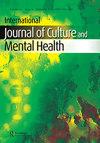精神分裂症的内化耻辱:患病率和预测因素的横断面研究
Q1 Social Sciences
International Journal of Culture and Mental Health
Pub Date : 2018-03-26
DOI:10.1080/17542863.2018.1450431
引用次数: 10
摘要
自我耻辱是精神分裂症的主要问题,对治疗和总体结果有着深远的影响,但很少被研究。在这项研究中,我们调查了精神分裂症门诊人群的患病率和内化耻辱的预测因素。我们招募了370名被诊断为精神分裂症的成年门诊患者。采用社会人口学和临床问卷、18项精神病学简要评定量表(BPRS-18)和29项精神疾病内化污名量表(ISMI)对所有参与者进行访谈。参与者平均年龄为37.87(±11.24)岁,其中女性189人(51.1%)。高度自我耻感的患病率为16.5%。在ISMI子量表中,高歧视体验(24.1%)高于高疏离感(22.4%)、高刻板印象认同(8.6%)和高社会退缩(20.3%)。只有28.1%的参与者在抗污名方面得分高。回归分析显示,高自我耻感与缺乏正规教育(OR = 3.908)、缺乏良好的社会支持(OR = 0.387)、基于bpr -18的高精神病理(OR = 1.156)和月平均收入低于25美元(OR = 0.4990)独立相关。自我耻辱感是精神分裂症患者在急性住院治疗之外的主要挑战。在门诊访问中获得的常规信息可能有助于对那些有高病耻感风险的人进行索引,以保证进一步的探索和有针对性的反病耻感干预。本文章由计算机程序翻译,如有差异,请以英文原文为准。
Internalized stigma in schizophrenia: a cross-sectional study of prevalence and predictors
ABSTRACT Self-stigma is a major problem in schizophrenia, with far reaching consequences on treatment and overall outcome, but scarcely examined. In this study we investigated the prevalence and predictors of internalized stigma in schizophrenia in an outpatient population. We recruited 370 adult outpatients with DSM-IV diagnosis of schizophrenia. All participants were interviewed with a sociodemographic and clinical questionnaire, the 18-item Brief Psychiatric Rating Scale (BPRS-18) and the 29-item Internalized Stigma of Mental Illness (ISMI) scale. The mean age of participants was 37.87 (± 11.24) years, and included 189 (51.1%) females. The prevalence of high self-stigma was 16.5%. As per ISMI subscales, high experience of discrimination was reported more by participants (24.1%) compared to high alienation (22.4%), high stereotype endorsement(8.6%), and high social withdrawal (20.3%). Only 28.1% of participants scored high on stigma resistance. Following regression analysis, the experience of high self-stigma was independently related to lack of formal education (OR = 3.908), absence of good social support (OR = 0.387), high psychopathology based on the BPRS-18 (OR = 1.156) and less than US$25 average income per month (OR = 0.4990). Self-stigma is a major challenge among patients with schizophrenia beyond acute in-patient treatment. Routine information elicited during clinic visits may help index those with high stigma risk to warrant further exploration and targeted anti-stigma intervention if needed.
求助全文
通过发布文献求助,成功后即可免费获取论文全文。
去求助
来源期刊

International Journal of Culture and Mental Health
Social Sciences-Cultural Studies
CiteScore
2.10
自引率
0.00%
发文量
0
期刊介绍:
This title has ceased (2018). This important peer-review journal provides an innovative forum, both international and multidisciplinary, for addressing cross-cultural issues and mental health. Culture as it comes to bear on mental health is a rapidly expanding area of inquiry and research within psychiatry and psychology, and other related fields such as social work, with important implications for practice in the global context. The journal is an essential resource for health care professionals working in the field of cross-cultural mental health.Readership includes psychiatrists, psychologists, medical anthropologists, medical sociologists, psychiatric nurses and social workers, general practitioners and other mental health professionals interested in the area. The International Journal of Culture and Mental Health publishes original empirical research, review papers and theoretical articles in the fields of cross-cultural psychiatry and psychology. Contributions from the fields of medical anthropology and medical sociology are particularly welcome. A continuing dialogue between members of various disciplines in various fields is encouraged. The aim of the journal is to encourage its readers to think about various issues which have clouded cross-cultural development of ideas. The journal lays special emphasis on developing further links between medical anthropology, medical sociology, clinical psychiatry and psychology, and implications of the findings on service provisions. The journal is published four times a year. The style of reference is Harvard. All research articles in this journal, including those in special issues, special sections or supplements, have undergone rigorous peer review, based on initial editor screening and anonymized refereeing by at least two independent referees.
 求助内容:
求助内容: 应助结果提醒方式:
应助结果提醒方式:


